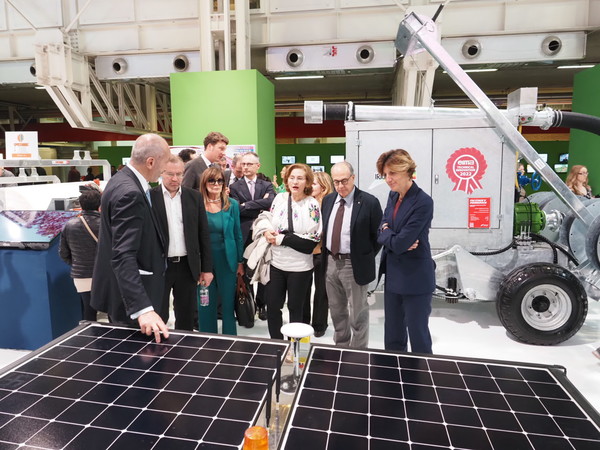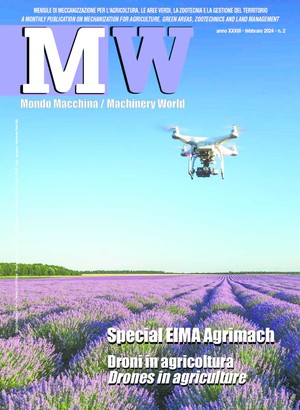
MEPs at EIMA: a policy for specialised crops
A delegation of ten parliamentarians visited the agricultural machinery exhibition. A conference, a guided tour and a round table were the programme of an event that highlighted the role of fruit and vegetable crops, which are increasingly important for the market and the profitability of the primary sector
The European Union considers precision agriculture an unavoidable objective to overcome the difficulties created by climate change and the increase in world population. This was reiterated by the President of the European Parliament's Committee on Agriculture and Rural Development, Norbert Lins, who visited EIMA in Bologna together with ten other MEPs.
"I was impressed," he said at the end of his tour of the exhibition halls, "by the technological level of these machines. We saw equipment that was very specialised and even used artificial intelligence. The quantity and quality of the innovations on display was striking," he said.
Prior to the tour of the pavilions, the delegation of parliamentarians attended a workshop held by Domenico Pessina, Professor of Agricultural Mechanics at the University of Milan on the 'Evolution of mechanisation for specialised crops'. That is, fruit and vegetable crops whose demand is growing worldwide due to a progressive evolution of eating habits that give more and more space to fresh products and, at the same time, see a reduction in cereals and other products from extensive crops. At the end of the visit to the exhibition, FederUnacoma President Alessandro Malavolti and Agriculture Commission President Lins held a short debate open to the public. Antoine Hoxha, technical director of Fertilizers Europe, an association of fertiliser manufacturers, participated in the meeting via a link-up. He noted how the price of gas, still the main source of energy also for the industry in his sector, had driven up costs unexpectedly.
"It is imperative to change the way we produce and use fertilisers," said Hoxha, "in order to deal with this crisis that has taken us by surprise, but also because we need to accelerate the process towards sustainability. The way forward is the one already identified and known as the Farm to Fork strategy".
Summing up the parliamentarians' visit, FederUnacoma president Alessandro Malavolti said: "It is now clear to everyone that new technologies are essential not only for the environment but also for the economy of farms, and that converting to specialised crops, those with the highest added value, requires investments in very sophisticated equipment in order to remain competitive on the market. But it is equally clear that this equipment costs more than traditional equipment".
The response of the President of the EU Agriculture Commission was reassuring: "The agricultural policy that will come into force in a few weeks is intended to provide the tools to achieve these goals," he said, "but it is also a cultural change. In many areas of the Union, starting with my country, Germany, farms continue to invest in extensive crops, from wheat to potatoes, and are struggling to understand the advantages of fruit and vegetables in a market that is changing fast".
Together with former Agriculture Commission President Paolo De Castro, also the Norbert Lins and Vice-President Mazaly Aguilar took part in the Bologna event, Agri member Camilla Laurenti.
The crowded EIMA pavilions also hosted the IMCO Commission (Internal Market) represented by vice-president Maria Grapini and member Alessandra Basso, while for the Industry Commission, Vice President Patrizia Toia and MEP Nicola Danti were attending.
Closing the large group of parliamentarians, Pietro Fiocchi, member of the ENVI (Environment) Commission, Matteo Borsani Director of Confindustria Brussels and Filippo Pozzi of ID Group.
Paolo De Castro: "technology in agriculture is the weapon to tackle the crisis"
“Technological innovation, with the application of Smart and Precision Farming, are necessary tools that can no longer be postponed for farmers grappling with a severe energy crisis and soaring raw material costs, which are putting a strain on farm incomes”. These were the words of Paolo De Castro MEP, several times italian Minister of Agriculture and a full member of the Agriculture Committee of the EU Parliament, who spoke at the 45th a edition of EIMA International.
"These are now established techniques, like those of Assisted Evolution (Tea), awaiting a green light from the European Commission, which should soon enable farmers themselves to make up for the 50% cut in chemically synthesised pesticides, as indicated in the Green Deal.
During the visit of MEPs to EIMA, Paolo De Castro, who in Brussels is also rapporteur of an important regulation reforming foodstuffs with geographical indications, illustrated to his colleagues the latest technological innovations on display at the exhibition.
A source of pride for the entire agri-food system and for made-in-Italy agricultural machinery.








